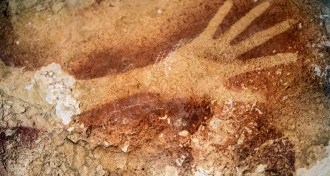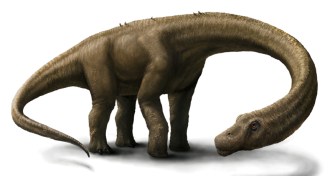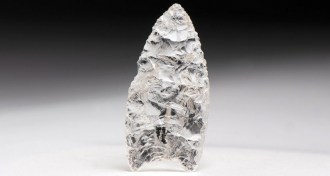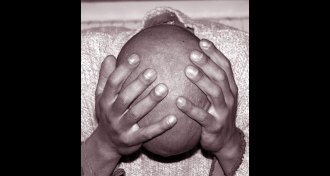Humans
Sign up for our newsletter
We summarize the week's scientific breakthroughs every Thursday.
-
 Health & Medicine
Health & MedicineYear in review: Risks of e-cigarettes emerge
Electronic cigarettes dispense water vapor laced with flavors and often a hefty dose of nicotine. These vapors may be far from benign, studies in 2014 suggested.
By Janet Raloff -
 Neuroscience
NeuroscienceYear in review: Young blood aids old brains
Ingredients in young blood can rejuvenate old mice’s bodies and brains, scientists reported in 2014.
-
 Health & Medicine
Health & MedicineYear in review: Gut reacts to artificial sweeteners
Saccharin messes with the body’s ability to metabolize fuel, a condition that often precedes diabetes, obesity and other metabolic problems.
-
 Anthropology
AnthropologyYear in review: Asian cave art got an early start
Stone Age cave painting began at about the same time in Southeast Asia as in Europe, challenging the idea that Western Europeans cornered the market on creativity 40,000 years ago.
By Bruce Bower -
 Archaeology
ArchaeologyYear in review: Roster of dinosaurs expands
With the discovery of several new species and a few dogma-shaking revelations, dinosaurs got a total rethink in 2014.
By Meghan Rosen -
 Humans
HumansYear in review: Genes, bones tell new Clovis stories
The genes and bones of the Clovis people reveal the range and legacy of the early North Americans.
By Bruce Bower -
 Health & Medicine
Health & MedicineGene variant linked to robust flu vaccine response
Targeting an immune signaling protein called interleukin-28B might boost protection generated by flu shots.
By Nathan Seppa -
 Genetics
GeneticsEarly heart attack tied to rare mutations in two genes
Rare mutations in two genes greatly increase the risk of having a heart attack early in life, a study shows.
-
 Health & Medicine
Health & MedicineHallucinated voices’ attitudes vary with culture
Culture puts good or bad spin on voices heard by people with schizophrenia.
By Bruce Bower -
 Life
LifeImprisoning parasites can deter malaria’s spread
Disabling a protein traps malaria-causing parasites within red blood cells and prevents the organisms from reproducing.
-
 Genetics
GeneticsNew type of stem cells, fuzzy and flexible
A new way to make stem cells produces fuzzy cells that appear as flexible as other types of stem cells, but are easier to grow in the lab and avoid ethical issues.
-
 Health & Medicine
Health & MedicineCells in groups may promote cancer’s spread
Cellular gangs, not individuals, form distant tumors from breast malignancies, a new study finds.